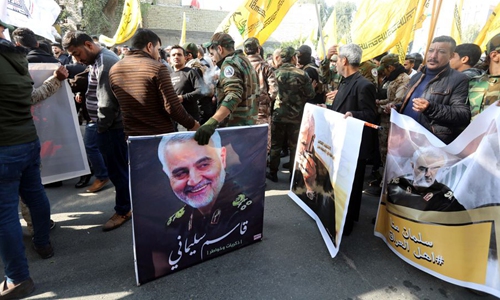HOME >> OPINION
Has the US lost direction in Middle East?
By Xin Qiang Source:Global Times Published: 2020/1/8 21:18:40

A group of mourners holding pictures of top Iranian commander Qassem Soleimani in Baghdad, Iraq on Saturday. Photo: Xinhua/Khalil Dawood
After a US drone strike killed top Iranian military commander Qasem Soleimani in Iraq, it was expected that Iran would retaliate. But the way it fought back - launching missiles against US bases in Iraq - was unexpected. Iran's Islamic Revolutionary Guard Corps carried out the mission.Since Iran did not target US soil, the move cannot be viewed as a declaration of war. Iran did aim at US troops, but the troops are stationed in Iraq. This showed Tehran is well aware how far it should go and has left some ground. Iran doesn't want a fierce clash or a war with the US. As Iranian Foreign Minister Javad Zarif claimed on Wednesday morning after the attack, the country was taking measures in self-defense.
US President Donald Trump tweeted hours after the attack that he "will be making a statement tomorrow morning." This is not Trump's style. It means the US knows how severe the situation is and Trump wouldn't, couldn't and shouldn't make an impulsive move.
In a statement on Wednesday morning, Trump said the US "will immediately impose additional punishing economic sanctions" on Iran, without directly threatening military action. One of Trump's principles after assuming office is not to be involved in a war. His latest statement has sent a signal of such a wish to avoid storming into a war.
It is likely that the US and Iran had communicated about it beforehand. As some reports speculated - Tehran told Washington through proxies in advance that it would bomb US bases in Iraq as a response to Soleimani's killing. The two sides may have co-directed the political drama. In that case, Iran has given the US an out and it is time for the US to extricate both Iran and itself from the standoff.
What will happen next depends on how harsh the economic sanctions against Iran will be. Iran claimed that it will no longer abide by restrictions imposed by the 2015 nuclear deal. But at least the possibility of imminent escalation of military conflict is low.
US military killed Iran's most powerful military commander on Iraq's soil, which is an act of state terrorism although the US itself does not think so. Soleimani was not an internationally acknowledged "terrorist." His assassination is not only a blow to Iran, but also brings to the fore US disregard for Iraqi sovereignty.
Why has Trump taken such a radical action? Even top Pentagon officials were stunned, saying targeting Soleimani was the most extreme option. No one knows what Trump has been thinking.
Probably because of the killing of a US defense contractor in Iraq in December 2019 blamed by US officials on Iran-backed groups has Trump taken the decision. Soleimani was "a longtime enemy of America blamed for hundreds of US soldiers' deaths," said the Boston Herald.
Moreover, Trump may have failed to calculate that Iran would react in such a furious way. He knows little about diplomacy, not to mention the complex geopolitics of the Middle East. More importantly, Trump might want to show his tough side in diplomacy as the presidential election is approaching. This may have worked. "Trump's approval rating has already recovered from its impeachment slump," reported the Washington Post on Monday.
Each US administration wants to take the Middle East under its control. Not only because the region has the world's largest oil reserves, but also because of the interests of US allies in the region and their intertwined stakes there.
US withdrawal from the region would result in a power vacuum, which will be filled by other forces. In that case, US global hegemony will be shaken. That being said, Washington will not let go any chance to be in charge of the geopolitical and economic situation in the Middle East.
But US national power is on the wane and Americans are tired of being entrapped in the Middle East. The point is, if Washington walks away from the Middle East, how can it keep the region under control? This is the first paradox the US is facing.
Second, the US now considers China as its primary rival and wants to use its resources from Europe and the Middle East to contain China. If it is so, its presence in the Middle East will be surely diminished. Then how can it realize its goal of controlling the region? This is another dilemma.
Furthermore, the US used to take advantage of disputes among regional powers, so as to dominate the Middle East as a mediator at a relatively low cost. But the current US administration has basically messed up in this regard. US-Turkey ties are in shambles. Other US allies in the region, including Saudi Arabia, have started to believe Washington is not reliable. As a result, these countries are going their own way instead of following US orders. Washington's measures to handle the Middle East have become directionless.
The US, at least during Trump's presidency, will hardly turn the tables on the Middle East chessboard.
The author is deputy director of the Center for US Studies at Fudan University. opinion@globaltimes.com.cn
Posted in: VIEWPOINT